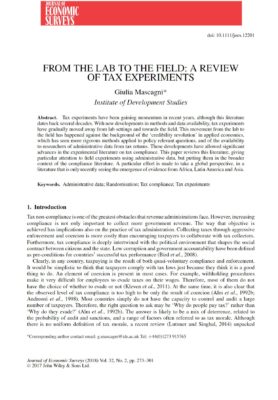Journal of Economic Surveys Volume 32, Issue 2
Tax experiments have been gaining momentum in recent years, although this literature dates back several decades. With new developments in methods and data availability, tax experiments have gradually moved away from lab settings and towards the field. This movement from the lab to the field has happened against the background of the ‘credibility revolution’ in applied economics, which has seen more rigorous methods applied to policy relevant questions, and of the availability to researchers of administrative data from tax returns. These developments have allowed significant advances in the experimental literature on tax compliance. This paper reviews this literature, giving particular attention to field experiments using administrative data, but putting them in the broader context of the compliance literature. A particular effort is made to take a global perspective, in a literature that is only recently seeing the emergence of evidence from Africa, Latin America and Asia.
